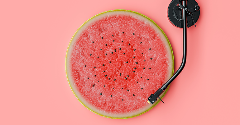News
The Evolution of Natural in European Food and Drink Innovation
17 Sep 2013Consumers are more wary about what they eat than ever before. It is clear, though, that the media coverage of the ‘evils’ of artificial additives has passed its peak. The mushrooming consumer demand for overtly ‘natural’ products seen in the last decade has thus started to subside. In 2007, 43% of UK consumers were prepared […]

Consumers are more wary about what they eat than ever before. It is clear, though, that the media coverage of the ‘evils’ of artificial additives has passed its peak. The mushrooming consumer demand for overtly ‘natural’ products seen in the last decade has thus started to subside. In 2007, 43% of UK consumers were prepared to pay a premium for foods without additives, and brand owners duly responded with a host of premium food innovation promoting the use of natural ingredients.
Through a combination of economic recession, the vagueness of what constitutes a natural mass-produced food, and consumer fatigue around the issue, by 2012 only 30% of consumers were prepared to pay a premium for such products. ‘Natural’ is thus no longer such a bankable route to premiumisation, with consumers coming to expect a greater degree of ‘naturalness’ as standard.
The use of natural colours in new food and drink launches, for example, is now widespread in Europe. Around eight in 10 food and drink launches using colours in recent years have used natural colours, largely accelerated by regulation introduced in 2010 that required warning labels to be used on products that contain the so-called Southampton Six colours.
In Europe, natural claims, including no additive/preservative claims, are being seen on 29% of launches so far in 2013, a figure which has consistently risen in recent years (being 25% in 2009). Special diet claims, though – such as free from gluten/lactose, as well as vegetarian – have been in faster growth, seen on 19% of launches so far in 2013, up from 13% in 2009.
The focus is thus switching from just additive/preservative-free claims to include other more specific ingredients that are high on the consumer’s radar and where avoidance has more of a value-add appeal.
Another shift in the natural foods arena has been the focus on simplicity and purity in food. Many brands have sought to promote the fact that they use only a limited number of ingredients and are thus not heavily-processed, complex products that are removed from nature.
Between 2010 and 2012, food and non-alcoholic drink launches in Europe that mentioned the word pure (or pur) on pack grew by over a quarter (26%) and look set for further growth in 2013. Such products are providing consumers with a very effective mental shortcut to a natural positioning, avoiding them having to read and understand ingredients lists.
Increasingly tied up with how consumers view naturalness is the ‘back story’ of any one product. Where the product has come from, how ethically it has been sourced or produced and safety assurances are also firmly in the mix in gaining consumer trust. Given that information around such elements of the supply chain is now readily made available by more producers and is more accessible by interested consumers, this back story will become more important to highlight. The opportunity to provide such information via on-pack QR codes in particular is being exploited by a number of major brand owners.
Related news

Retail landscape lacks nutritious and affordable food, says ATNi
30 Dec 2025
A rapid increase in modern food retail has given retailers growing influence over consumer diets, according to global non-profit ATNi’s latest assessment.
Read more
Debate over ban on ‘meaty’ names for plant-based products reaches stalemate
26 Dec 2025
The debate over a ban on plant-based products using “meaty” terms has reached a stalemate, leaving manufacturers in limbo and still facing overhauls to their marketing and packaging.
Read more
Multi-sensory food and drink products to gain traction in 2026
16 Dec 2025
Trend forecasters predict that sensory elements will play a larger role, helping food and beverage brands differentiate themselves in a competitive market in 2026.
Read more
Big appetite for M&A between European and US food and drink companies
3 Dec 2025
Persistent tariffs on EU food and beverage exports have helped drive record levels of M&A activity between European and US companies this year, according to analysis by ING.
Read more
Non-UPF Program extends certification scheme to entire food industry
30 Nov 2025
The Non-UPF Program has extended its certification scheme to the wider food sector, championing a move towards healthier consumption habits.
Read more
Lancet study links UPFs to chronic disease risk
26 Nov 2025
UPFs are consistently associated with an increased risk of diet-related chronic diseases, according to a comprehensive review of global evidence in The Lancet .
Read more
Concerns swirl around cinnamon’s compliance with EU law
25 Nov 2025
Cinnamon may be a top functional ingredient, but it needs stronger protocols to ensure it meets EU food safety laws and quality standards, say researchers.
Read more
Oat Barista: Innovation for game-changing beverages
20 Nov 2025
Oat Barista is a clean label, sustainable, and innovative drink base specifically designed to create the perfect foam in one single ingredient.
Read more
How younger consumers are redefining ingredient choices and rejecting brand loyalty
18 Nov 2025
Gen Z and millennial consumers’ preferences for transparency, functionality, and purpose are “redefining the very nature of consumption itself”, says SPINS.
Read more
Hybrid formats and flexible positioning to disrupt category norms in 2026
17 Nov 2025
Trend forecasters expect food and drink to move more fluidly across occasions, functions, and formats as consumers seek versatility, novelty, and convenience.
Read more